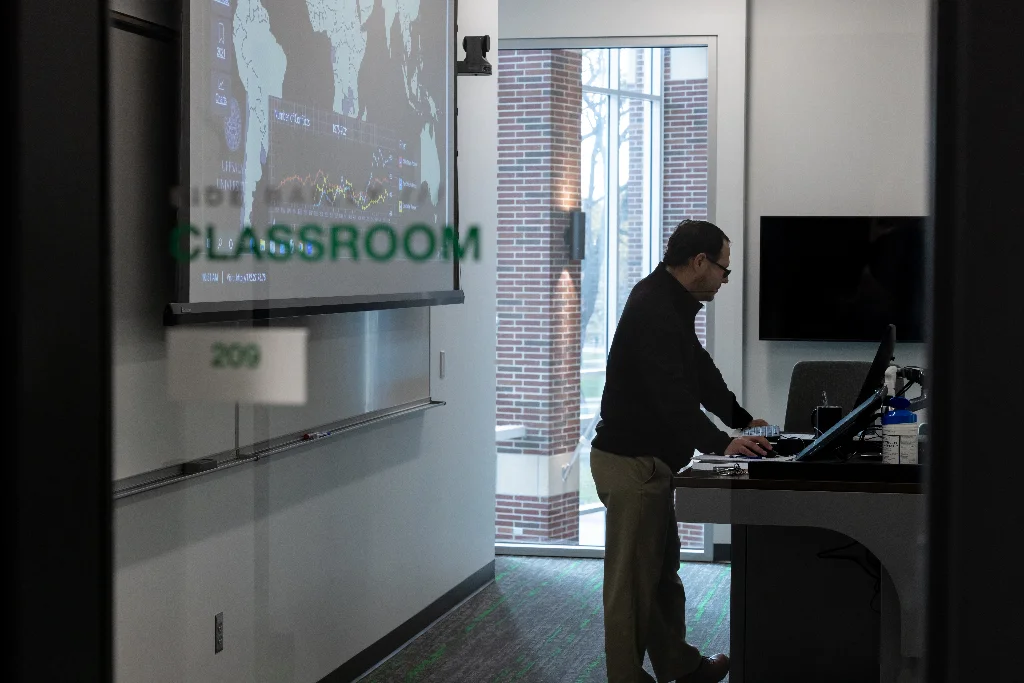
Political Science vs. International Relations
Throughout history, political science and international relations have generally evolved in tandem, tracing their roots back to ancient philosophies and the governance systems.
Request Information
This intertwined development has created a close relationship between the two fields, making it challenging to differentiate between them at first glance.
Despite their overlapping themes and methodologies, political science and international relations offer unique perspectives and specialized career paths. Let's explore the differences between political science vs. international relations to help you understand which discipline might be the better choice for your academic and professional aspirations.
What is Political Science?
Political science is the study of government, political processes, institutions and behavior. It focuses on the theory and practice of politics at various levels, from local governance to global interactions.
This field aims to understand the mechanisms that drive political behavior, the development and implementation of policies and the functioning of political systems. It examines the structure and function of government entities, political parties, electoral systems and public administration. Moreover, it draws on various methodologies, including philosophical analysis, empirical research and historical context, to explore issues like political economy, public policy and political theory.
Political scientists analyze how laws are made, how public opinion shapes policy, the role of political ideologies and the impact of social movements. They also investigate the influence of political culture and institutional frameworks on the stability and effectiveness of political systems.

What is International Relations?
International relations (IR) is a field concerned with the interactions between states and non-state actors on the global stage. It seeks to explain how and why countries engage with each other, form alliances, resolve conflicts and influence international norms and policies.
IR encompasses a wide range of topics, including international law, organizations, global trade and diplomacy. Scholars in this field study the behavior of international entities such as the United Nations, multinational corporations and non-governmental organizations.
This field utilizes diverse methodologies, such as political, historical and legal analysis, to understand the complex web of relationships that define global politics. This includes examining the causes and consequences of war, the processes of peacebuilding, the dynamics of international negotiations and the impact of global economic interdependence. Additionally, IR explores the role of international institutions in mitigating conflict, promoting human rights and fostering sustainable development.
Difference Between Political Science and International Relations
While political science and international relations share common ground, the two disciplines have several key differences. Understanding these distinctions can help students and professionals make informed decisions about their educational and career paths.
Educational Paths
Political science programs typically offer a broad-based education in the fundamentals of political systems, political theory and policy analysis. For instance, students pursuing a bachelor's degree in political science might take courses such as:
- Public Policy
- Comparative Politics
- International Politics
- American Government
IR programs, on the other hand, focus more on global issues and the dynamics of international interactions. Coursework often includes subjects like:
- International Law
- Global Security
- Foreign Policy Analysis
- International Organizations
In addition to degree programs, certifications can enhance a student's expertise and career prospects in both cases. For example, our International Relations & National Security certificate equips students with the skills to analyze and assess various components of national and international defense policies. It covers how countries utilize intelligence, diplomacy and military power to shape policies, enhance regional stability and respond to crises with military actions.
Specializations
In political science, students can typically specialize in areas such as:
- Political theory: Delving into the philosophical foundations of politics, justice and the state
- Comparative politics: Comparing political systems to understand their differences and similarities
- Public policy: Analyzing the development, implementation and effects of public policies
- Political economy: Exploring the relationship between politics and economics and how policy decisions impact economic outcomes
On the other hand, international relations offers specializations that include:
- Global governance: Studying the institutions and processes that manage global issues and regulate international cooperation
- International conflict and security: Examining the causes of conflicts, strategies for conflict resolution and the maintenance of international peace
- Diplomacy: Learning the art and practice of negotiating and managing international relations
- International economic relations: Analyzing trade policies, international finance and economic development
Skills
Political science students develop strong analytical and research skills, focusing on understanding and interpreting political data and trends. They learn to:
- Critically evaluate political systems, policies and theories
- Conduct empirical research and statistical analysis
- Communicate their findings effectively through writing and presentations
- Understand the historical context and philosophical underpinnings of political ideas
International relations students gain skills in:
- Diplomatic negotiation and conflict resolution
- Cross-cultural communication and understanding
- Strategic analysis of global political and economic trends
- Policy formulation and recommendation
Career Paths

Graduates in political science often pursue careers in government, public administration, political consulting and academia. They may work as follows:
- Policy analyst: Researching and analyzing policies to provide recommendations
- Legislative assistant: Supporting lawmakers by conducting research and drafting legislation
- Political advisor: Offering strategic advice to politicians and political parties
- Professor: Teaching and conducting research at universities
Those with a background in IR typically find opportunities in international organizations, non-governmental organizations (NGOs), foreign services and multinational corporations. Careers may include roles such as:
- Diplomat: Representing their countries and negotiating international agreements
- International development specialist: Working on projects to improve living conditions in developing countries
- Intelligence analyst: Assessing international threats and advising on national security
- Global trade consultant: Advising businesses on international trade policies and market entry strategies
Salaries
While salaries can vary significantly based on the specific role and level of experience, it's important to note that both political science and international relations offer competitive salaries with significant earning potential. This potential is particularly promising for those who aspire to advance to senior positions, where the earning potential is even more substantial.
Political science professionals typically earn an average annual wage of around $72,176. The salary can increase substantially with experience and higher qualifications as at the upper end of the spectrum professionals in political science can earn as much as $155,500 annually. These higher salaries are often found in senior positions such as senior policy advisor, political science professor and high-level consultant.
On the other hand, professionals in IR have an average annual wage of approximately $78,084. Similar to political science, the salary in international relations can vary widely based on the specific position and experience level. On the higher end, professionals in international relations can earn up to $134,000 per year. High-paying roles in this field often include senior diplomats, international organization executives and senior analysts in multinational corporations.
When comparing the average annual salaries in both fields, it's clear that they are fairly close. However, IR generally offers a slightly higher average wage. On the other hand, political science has a higher potential for career growth, which might be attributed to the diversity of roles within each field and the varying levels of responsibility and expertise required.
Political Science vs. International Relations: Which is Right for You?
Deciding whether to pursue a career in political science or international relations depends on your interests, career goals and the impact you wish to make. If you are fascinated by the workings of government, the intricacies of policy-making and the dynamics of political systems within a country, political science might be the right path for you. On the other hand, if you're drawn to global issues, international diplomacy and the complex interactions between countries and international organizations, a career in international relations might be a better fit.
Take a moment to reflect on what truly motivates you: the prospect of engaging with domestic political issues and shaping national policy or the challenge of navigating the complexities of global affairs and fostering international cooperation. Both fields present unique and rewarding opportunities, but the decision between political science or international relations should ultimately be guided by your passion and the type of expertise you aspire to develop.
By carefully evaluating your interests and career aspirations, you can make a more informed decision about which field to pursue, ensuring that your educational and professional journey align with your goals.
Conclusion
Political science and international relations are distinct yet interrelated fields that offer unique insights into the workings of political systems and global interactions. By understanding their differences, students and professionals can better navigate their educational and career choices, identifying the path that best matches their aspirations and objectives.
Whether you're drawn to the study of government and domestic politics or the complexities of international affairs, both disciplines provide valuable tools to understand and shape the world we live in.
Ready to take the next step? Explore our programs and certifications so you can start making a global impact today. Remember, the future of our world depends on informed and passionate leaders—why not be one of them?
FAQs
Yes, international relations is often considered a subfield of political science. It focuses specifically on the interactions between states and non-state actors on the global stage, encompassing areas such as diplomacy, international law and global security.
Studying political science or international relations offers diverse career opportunities in government, non-profits, international organizations and the private sector. These fields enhance critical skills like analytical thinking, research, communication and problem-solving, and provide a global perspective on international issues, law and diplomacy. Graduates can significantly impact public policy, governance and international peace and security.
Yes, both fields can lead to opportunities for travel and working abroad. Careers in international relations, in particular, often involve roles in diplomacy, international development and global organizations, which may require international travel. Political science careers can also offer opportunities abroad, especially in international policy and consultancy roles.